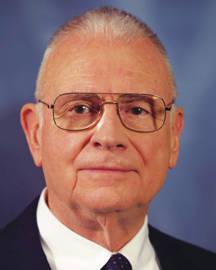You can lay the groundwork for reforming Congress
Published 2:34 pm Tuesday, December 12, 2017
The first three words of the U.S. Constitution are, “We the People.” The Constitution itself, our institutions of government, the democratic process — all were established to give Americans a voice in their own governance. We are still striving to make that vision real for all, but we are closer than ever.
So let me ask you some questions about Congress today. Do you think the voice of ordinary Americans resounds strongly in its hallways and chambers? Can you recall Congress in the last few years successfully dealing with an issue that directly affected your life? Does Congress produce legislation that resolves our differences and brings us closer together? Do you believe that the political system produces members of Congress who fairly and effectively represent the diversity and complexity of this country and are addressing our real, long-term challenges?
I thought not.
This is why I believe it’s past time for comprehensive reform of Congress. Representative democracy today is being undermined by the rising power of big money, the challenges of governing a country as large and diverse as ours, the problems brought by rising economic inequality, the ineffectiveness of our political institutions, and too many citizens who were never taught the skills needed to make the pragmatic judgments necessary in a representative democracy.
In the present environment, it’s doubtful that the various reforms needed to address these challenges can actually get adopted. But their time will come, either because the public demands it or the cost of dysfunction becomes too obvious to ignore.
So it’s important to know in advance where we need to head.
To be sure, part of what we need is outside the purview of any single institution. We lack a robust, comprehensive system of civic education, designed to produce an engaged, informed electorate able to sort fact from fiction in a complicated world. We want citizens who know how to maintain healthy skepticism and wariness about elected officials, and who have the knowledge and confidence to hold them accountable.
But there are also steps we need our lawmakers to take.
Partisan gerrymandering has become a scandal; competitive congressional districts drawn to represent the population fairly are vital to our future. Similarly, we have to expand voter participation and fight efforts to repress votes; lower participation empowers the extremes in politics, and it’s hurting our country. And we need to make it easier for third parties to break into the system; people are losing confidence in the two parties and we need to open up the system to new participants.
Greater transparency from those in power or those seeking to influence those in power truly matters. Disclosure of campaign donations, disclosure of foreign money’s track through our political system, disclosure of special-interest spending, identifying the people who make contributions to secretive political committees, details about financial conflicts of interest — all of this should be a habit in any self-respecting representative democracy. Extensive disclosure needs to be required by law, and backed up with the resources to enforce the law.
On Capitol Hill, members need to fund and then rely on independent sources of information they can trust, rather than special interests who too often lay down their own interpretation of the facts as a legislative foundation. And they need to return to the traditional processes of gathering expert testimony through congressional hearings.
And perhaps more than anything, Congress needs to revitalize the institution itself — by energizing the traditional committee structure and practices, giving up its ridiculous habit of enacting budgets through omnibus bills, and no longer allowing major legislation to be put together by a few leadership staff behind closed doors — and restore its power vis-à-vis the president.
This is where you come in. The changes that I’m advocating will not come about without citizen action. Our lawmakers have become fixated on their re-election and too comfortable with the status quo they and their predecessors have built in recent decades. We have to hold politicians to the highest ethical standards, and have them come up with serious proposals to fix the system. Without that, the loss of faith in our process and our institutions that all of us lament will be almost impossible to reverse.
Lee Hamilton is a Senior Advisor for the Indiana University Center on Representative Government; a Distinguished Scholar, IU School of Global and International Studies; and a Professor of Practice, IU School of Public and Environmental Affairs. He was a member of the U.S. House of Representatives for 34 years.



